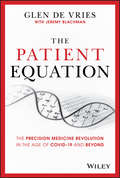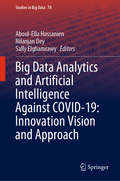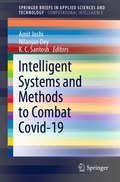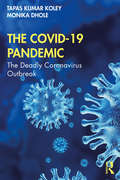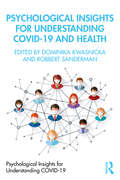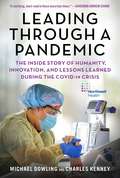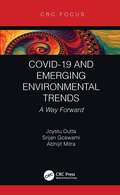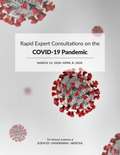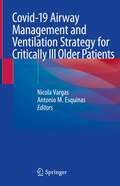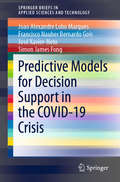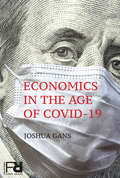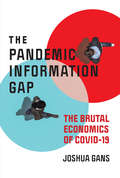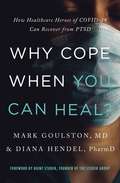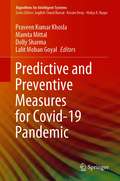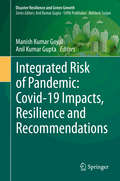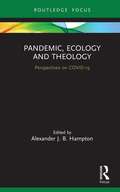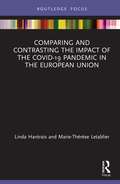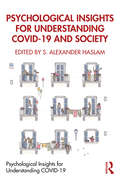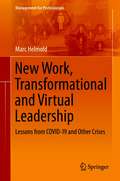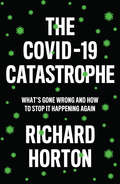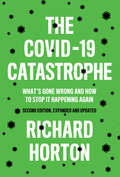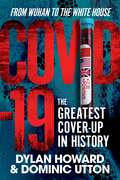Special Collections
Everything you ever wanted to know about the COVID-19 pandemic
- Table View
- List View
The Patient Equation
by Glen de VriesHow the data revolution is transforming biotech and health care, especially in the wake of COVID-19—and why you can’t afford to let it pass you by We are living through a time when the digitization of health and medicine is becoming a reality, with new abilities to improve outcomes for patients as well as the efficiency and success of the organizations that serve them. In The Patient Equation, Glen de Vries presents the history and current state of life sciences and health care as well as crucial insights and strategies to help scientists, physicians, executives, and patients survive and thrive, with an eye toward how COVID-19 has accelerated the need for change. One of the biggest challenges facing biotech, pharma, and medical device companies today is how to integrate new knowledge, new data, and new technologies to get the right treatments to the right patients at precisely the right times—made even more profound in the midst of a pandemic and in the years to come. Drawing on the fascinating stories of businesses and individuals that are already making inroads—from a fertility-tracking bracelet changing the game for couples looking to get pregnant, to an entrepreneur reinventing the treatment of diabetes, to Medidata's own work bringing clinical trials into the 21st century—de Vries shares the breakthroughs, approaches, and practical business techniques that will allow companies to stay ahead of the curve and deliver solutions faster, cheaper, and more successfully—while still upholding the principles of traditional therapeutic medicine and reflecting the current environment. How new approaches to cancer and rare diseases are leading the way toward precision medicine What data and digital technologies enable in the building of robust, effective disease management platforms Why value-based reimbursement is changing the business of life sciences How the right alignment of incentives will improve outcomes at every stage of the patient journey Whether you're a scientist, physician, or executive, you can't afford to let the moment pass: understand the landscape with this must-read roadmap for success—and see how you can change health care for the better.
Big Data Analytics and Artificial Intelligence Against COVID-19: Innovation Vision and Approach
by Aboul-Ella Hassanien and Nilanjan Dey and Sally ElghamrawyThis book includes research articles and expository papers on the applications of artificial intelligence and big data analytics to battle the pandemic. In the context of COVID-19, this book focuses on how big data analytic and artificial intelligence help fight COVID-19. The book is divided into four parts. The first part discusses the forecasting and visualization of the COVID-19 data. The second part describes applications of artificial intelligence in the COVID-19 diagnosis of chest X-Ray imaging. The third part discusses the insights of artificial intelligence to stop spread of COVID-19, while the last part presents deep learning and big data analytics which help fight the COVID-19.
Intelligent Systems and Methods to Combat Covid-19
by Nilanjan Dey and Amit Joshi and K. C. SantoshThis book discusses intelligent systems and methods to prevent further spread of COVID-19, including artificial intelligence, machine learning, computer vision, signal processing, pattern recognition, and robotics. It not only explores detection/screening of COVID-19 positive cases using one type of data, such as radiological imaging data, but also examines how data analytics-based tools can help predict/project future pandemics. In addition, it highlights various challenges and opportunities, like social distancing, and addresses issues such as data collection, privacy, and security, which affect the robustness of AI-driven tools. Also investigating data-analytics-based tools for projections using time series data, pattern analysis tools for unusual pattern discovery (anomaly detection) in image data, as well as AI-enabled robotics and its possible uses, the book will appeal to a broad readership, including academics, researchers and industry professionals.
The COVID-19 Pandemic
by Tapas Kumar Koley and Monika DholeThis volume presents a comprehensive account of the COVID-19 pandemic, also known as the novel coronavirus pandemic, as it happened. Originating in China in late 2019, the COVID-19 outbreak spread across the entire world in a matter of three to four months. This volume examines the first responses to the pandemic, the contexts of earlier epidemics and the epidemiological basics of infectious diseases. Further, it discusses patterns in the spread of the disease; the management and containment of infections at the personal, national and global level; effects on trade and commerce; the social and psychological impact on people; the disruption and postponement of international events; the role of various international organizations like the WHO in the search for solutions; and the race for a vaccine or a cure. Authored by a medical professional and an economist working on the frontlines, this book gives a nuanced, verified and fact-checked analysis of the COVID-19 pandemic and its global response. A one-stop resource on the COVID-19 outbreak, it is indispensable for every reader and a holistic work for scholars and researchers of medical sociology, public health, political economy, public policy and governance, sociology of health and medicine, and paramedical and medical practitioners. It will also be a great resource for policymakers, government departments and civil society organizations working in the area.
Psychological Insights for Understanding Covid-19 and Health
by Dominika Kwasnicka; Robbert SandermanWith specially commissioned introductions from international experts, the Psychological Insights for Understanding COVID-19 series draws together previously published chapters on key themes in psychological science that engage with people’s unprecedented experience of the pandemic. In this volume on health, Dominika Kwasnicka and Robbert Sanderman introduce chapters that explore the crucial topics of health behaviour change, wellbeing, stress, and coping. They highlight the key role digital health technologies can play in how we manage health conditions, and how we facilitate change to help individuals manage stressful situations such as physical isolation, job loss, and financial strain during the COVID-19 pandemic. The volume also offers an important overview of environmental and policy-based approaches to health behaviour change and addresses the highly relevant issues of identity and trust and how they shape the health of individuals, communities, and society. Highlighting theory and research on these key topics germane to the global pandemic, the Psychological Insights for Understanding COVID-19 series offers thought-provoking reading for professionals, students, academics, and policymakers concerned with psychological consequences of COVID-19 for individuals, families, and society.
Leading Through a Pandemic
by Charles Kenney and Michael J. Dowling"A clarifying must-read in these uncertain times.&” —GOVERNOR ANDREW CUOMO Journey behind the front lines of the coronavirus pandemic with Northwell Health, New York&’s largest health system. What was it like at the epicenter, inside the health system that cared for more COVID-19 patients than any other in the United States? Leading Through a Pandemic: The Inside Story of Lessons Learned about Innovation, Leadership, and Humanity During the COVID-19Crisis takes readers inside Northwell Health, New York&’s largest health system. From the C-suite to the front lines, the book reports on groundwork that positioned Northwell as uniquely prepared for the pandemic. Two decades ago, Northwell leaders began preparing for disasters—floods, hurricanes, blackouts, viruses, and more based on the belief that "bad things will happen and we have to be ready." Following a course highly unusual for an American health system, Northwell developed one of the most advanced non-government emergency response systems in the country. Northwell reached a point where leaders could confidently say "we are comfortable being uncomfortable in a crisis." But even with sustained preparation, the pandemic stands as a singularly humbling experience. Leading Through a Pandemic offers guidance on how hospitals and health systems throughout the country can prepare more effectively for the next viral threat. The book includes dramatic stories from the front lines at the peak of the viral assault and lessons of what went well, and what did not. The authors draw upon the Northwell experience to prescribe changes in the health care system for next time. Beyond the obvious need for increased stockpiles of supplies and equipment is the far more challenging task of fundamentally changing the culture of American health care to embrace a more robust emergency response capability in hospitals and systems of all sizes across the nation. The book is a must read for health care professionals, policy-makers, journalists, and readers whose curiosity demands a deeper dive into the surreal realm of the coronavirus pandemic.
COVID-19 and Emerging Environmental Trends
by Abhijit Mitra and Joystu Dutta and Srijan GoswamiThe extensive safety restrictions imposed globally due to the COVID-19 pandemic have brought significant changes to almost all environmental parameters. The largest pandemic of the century has left an indelible mark on all aspects of human life and the environment. This book revolves around COVID-19 and its influence on all biotic and abiotic components on earth, with a focus on the regulatory role of air quality during the pandemic, environmental toxicity and susceptibility to COVID-19, and the impact of the lockdown on different ecosystems. The book fundamentally explains the biology of SARS-CoV-2 and the pathophysiology and epidemiology of COVID-19. Dedicated chapters highlight the ongoing global cutting-edge research on COVID-19, control and safety measures, and public health concerns. COVID-19 and Emerging Environmental Trends: A Way Forward is aimed at graduate and postgraduate students as well as researchers in environmental and medical science, health and safety, and ecology. This book offers a multiperspective and multidisciplinary approach to the discussion of the pandemic as well as emerging environmental issues, current trends, and a way forward. As humanity stands face-to-face with the largest global crisis in recent times, this book helps readers to easily understand its various aspects from a beginner’s perspective, without going into the intricate technicalities of medical science or environmental science, and beautifully juxtaposes critical issues with lucid language and flexible scientific explanations.
Rapid Expert Consultations on the COVID-19 Pandemic
by Engineering and Medicine and National Academies of SciencesIn response to a request from the Office of Science and Technology Policy and the Office of the Assistant Secretary for Preparedness and Response, the National Academies of Sciences, Engineering, and Medicine convened a standing committee of experts to help inform the federal government on critical science and policy issues related to emerging infectious diseases and other 21st century health threats. This set of Rapid Expert Consultations are the first of their kind and represent the best evidence available to the Committee at the time each publication was released. The science on these issues is continually evolving, and the scientific consensus the Committee reaches on these topics will likely evolve with it. The standing committee includes members with expertise in emerging infectious diseases, public health, public health preparedness and response, biological sciences, clinical care and crisis standards of care, risk communication, and regulatory issues.
Covid-19 Airway Management and Ventilation Strategy for Critically Ill Older Patients
by Antonio M. Esquinas and Nicola VargasThis book describes the issues and challenges that clinicians encountered in the management of older critically ill patients during the Covid-19 pandemic, and offers practical information on how to manage them. Older adults are more susceptible to complications such as acute respiratory distress syndrome (ARDS) as a result of viral pneumonia. In addition, they often have multiple comorbidities and are commonly frail, which means their various organs and systems, such as the respiratory system, have reduced functional reserves. As such, older adults are less able to react to acute stressors. During the current Covid-19 pandemic, older adult patients' mortality is increased. Further, the infection and death rates of elderly people in nursing homes and health care institutions are high.Management of older adults with Covid is complicated. The reduced availability of beds may limit their access to ICU. Moreover, the prognosis may be poor, and airway management and ventilation strategies have to take into account various clinical and physiological characteristics specific to older patients. This book is addressed to all allied professionals involved in the management of older critically ill patients and presents information collected and practical lessons learned from the clinical daily management of this population during the pandemic.
Predictive Models for Decision Support in the COVID-19 Crisis
by Simon James Fong and Joao Alexandre Marques and Francisco Nauber Gois and José Xavier-NetoCOVID-19 has hit the world unprepared, as the deadliest pandemic of the century. Governments and authorities, as leaders and decision makers fighting the virus, enormously tap into the power of artificial intelligence and its predictive models for urgent decision support. This book showcases a collection of important predictive models that used during the pandemic, and discusses and compares their efficacy and limitations. Readers from both healthcare industries and academia can gain unique insights on how predictive models were designed and applied on epidemic data. Taking COVID19 as a case study and showcasing the lessons learnt, this book will enable readers to be better prepared in the event of virus epidemics or pandemics in the future.
Economics in the Age of COVID-19
by Joshua GansA guide to the pandemic economy: essential reading about the long-term implications of our current crisis.The COVID-19 pandemic has unleashed a firehose of information (much of it wrong) and an avalanche of opinions (many of them ill-founded). Most of us are so distracted by the everyday awfulness that we don't see the broader issues in play. In this book, economist Joshua Gans steps back from the short-term chaos to take a clear and systematic look at how economic choices are being made in response to COVID-19. He shows that containing the virus and pausing the economy—without letting businesses fail and people lose their jobs—are the necessary first steps.
The Pandemic Information Gap
by Joshua GansWhy solving the information problem should be at the core of our pandemic response: essential reading about the long-term implications of our current crisis.COVID-19 is caused by a virus. The COVID-19 pandemic is caused by a lack of good information. A pandemic is essentially an information problem: this is the enlightening and provocative idea at the heart of this book. If we solve the information problem, argues economist Joshua Gans, we can defeat the virus. For example, when we don't know who is infected, we have to act as if everyone is infected. If we actively manage the information problem--if we know who is infected and with whom they had contact--we can suppress the virus or buy time for vaccine development.This is an expanded version of an eBook originally published as Economics in the Age of COVID-19.
Best Buy's Corie Barry: Confronting the COVID-19 Pandemic
by William W. George and Amram MigdalThis case examines the leadership of Corie Barry, the new CEO of Best Buy, with a focus on actions the company took in 2020 to adapt to the COVID-19 pandemic. The case includes a history of Best Buy's strategy and leadership, including the transitions between the company's founder and the subsequent four CEOs. In particular, the career trajectory of CEO Corie Barry is described in detail. Regarding Best Buy's response to COVID-19, the case details the company's scenario planning and operational adjustments, including the temporary closure of all stores followed by the rapid establishment of curbside-pickup customer-order-fulfillment operations at roughly 1,000 store locations in the U.S. The case also attends to leadership's decisions to furlough more than 51,000 frontline employees, suspend in-home services, and subsequently resume in-store services under modified operating procedures.
Why Cope When You Can Heal?
by Mark Goulston and Diana HendelWhy Cope When You Can Heal? is an essential resource for doctors, nurses, paramedics, and other healthcare professionals—and the leaders who support them—as they navigate the traumatic stress they have experienced and continue to face.COVID-19 has traumatized the world—and no group has been more impacted than frontline healthcare workers. They&’ve worked without adequate personal protective equipment (PPE), witnessed mass death, and been forced to make choices that haunt them. Many have fallen ill, while others have worried endlessly about their own health and that of their loved ones.And even after months of battling this invisible enemy, no end is in sight.Additionally, all of this is happening in the context of a divided nation, a struggling industry, and a &“just get over it&” culture that exacerbates the problems healthcare workers face, while minimizing their suffering.These factors have created the perfect storm for widespread stress, depression, anxiety, and hopelessness—and, increasingly, posttraumatic stress disorder (PTSD). This empathetic and concise guide contains:real-world accounts and experiences from frontline workers;an overview of treatment options; andexercises, tools, and tips that you can use today. Read this book to help yourself—and those you love and support in the COVID-19 battle—begin the process of healing from the inside out and reconnect with the joys and rewards of career and life.&“This is the book we as clinicians need right now . . . (it) will save lives.&” --Stephen K. Klasko, MD, MBA, Pres/CEO Thomas Jefferson University/Jefferson Health &“This quick and easy read will benefit many on the frontlines of the COVID-19 pandemic and is an essential addition to any organization looking to help their teams thrive and build resilience in the midst of chronic stress and leadership burnout.&” --Myra Gregorian, Chief People Officer, Seattle Children&’s &“A must-read for every healthcare provider or leader . . . filled with hope, inspiration, and lots of practical, evidence-based techniques and treatments for managing traumatic stress.&” --Jagat Narula, MD, PhD, Chief of Cardiology, Mount Sinai Morningside Hospital
Predictive and Preventive Measures for Covid-19 Pandemic
by Mamta Mittal and Lalit Mohan Goyal and Praveen Kumar Khosla and Dolly SharmaThis book explores the inputs with regard to individuals and companies who have developed technologies and innovative solutions, bioinformatics, datasets, apps for diagnosis, etc., that can be leveraged for strengthening the fight against coronavirus. It focuses on technology solutions to stop Covid-19 outbreak and mitigate the risk. The book contains innovative ideas from active researchers who are presently working to find solutions, and they give insights to other researchers to explore the innovative methods and predictive modeling techniques. The novel applications and techniques of established technologies like artificial intelligence (AI), Internet of things (IoT), big data, computer vision and machine learning are discussed to fight the spread of this disease, Covid-19. This pandemic has triggered an unprecedented demand for digital health technology solutions and unleashing information technology to win over this pandemic.
Integrated Risk of Pandemic: Covid-19 Impacts, Resilience and Recommendations
by Anil Kumar Gupta and Manish Kumar GoyalIn light of the novel corona virus outbreak in December 2019 and its subsequent impact on entire world as a global pandemic, the book attempts to provide integrated risk assessment on Covid -19 like pandemics, as well as to understand the societal, environment and economic impact of the outbreak in various sectors of development. It covers fundamental factors of global disease outbreaks and its coverage as major disaster through the complexity and severity of consequences, illustrating the dimensions of low frequency high intensity disasters. It brings together broad range of topics including basic concepts, isolation measure, role of governance and key technical advancements for containing the diseases. In addition, it also covers resilience analysis towards the impacts such outbreaks have on bio-diversity, ecosystem services and agricultural food production. It defines key exit strategies from the lessons learned and success stories of historical disease outbreaks. The book is presented in four parts, where part 1 familiarizes with fundamentals; part 2 focuses on integrated risk assessments; part 3 focuses on various measures and strategies of resilience; and part 4 suggests key lessons and recommendations. The book is a useful reading reference for scientific community, policy makers and professionals across the domains of health, environment, disasters and sustainable development. Book is specifically beneficial for postgraduate students, researchers, planners and field professionals.
Jan Swartz: Steering Princess Cruises Through the COVID-19 Crisis
by Boris Groysberg and Michael NorrisIn the summer of 2020, Jan Swartz, President of Princess Cruises, was persevering to lead her company back from the depths of the COVID-19 Pandemic. Diamond Princess, one of Princess Cruises' 18 ships was the site of one of the earliest large outbreaks of COVID-19 outside of China. The outbreak led to hundreds of cases, at least a dozen deaths, media scrutiny, government investigations, and legal proceedings. In early March 2020, Swartz made the decision to pause all global operations of her company, the first cruise company to do so. Six months later, how could Princess Cruises restart operations safely and profitably?
Coronavirus - COVID-19
by Hesperian Health GuidesCOVID-19 is a disease caused by a coronavirus, which is a small germ (too small to see without a microscope), that can spread between people. Hesperian Health Guide's COVID-19 fact sheet helps clearly answer the following important questions: What is COVID-19? How does the coronavirus spread? Who does coronavirus infect? How can you prevent infection?
Pandemic, Ecology and Theology
by Alexander J. B. HamptonAs the sequential stages of the 2020 COVID-19 pandemic have unfolded, so have its complexities. What initially presented as a health emergency, has revealed itself to be a phenomenon of many facets. It has demonstrated human creativity, the oft neglected presence of nature, and the resilience of communities. Equally, it has exposed deep social inequities, conceptual inadequacies, and structural deficiencies about the way we organize our civilization and our knowledge. As the situation continues to advance, the question is whether the crisis will be grasped as an opportunity to address the deep structural, ecological and social challenges that we brought with us into the second decade of the new millennium. This volume addresses the collective sense that the pandemic is more than a problem to manage our way out of. Rather, it is a moment to consider our broken relationship with the natural world, and our alienation from a deeper sense of purpose and meaning. The contributors, though differing in their diagnoses and recommendations, share the belief that this moment, with its transformative possibility, not be forfeit. Equally, they share the conviction that the chief ground of any such reorientation ineluctably involves our collective engagement with both ecology and theology.
Comparing and Contrasting the Impact of the COVID-19 Pandemic in the European Union
by Linda Hantrais and Marie-Thérèse LetablierComparing and Contrasting the Impact of the COVID-19 Pandemic in the European Union challenges the use of uncontextualised comparisons of COVID-19 cases and deaths in member states during the period when Europe was the epicentre of the pandemic. This timely study looks behind the headlines and the statistics to demonstrate the value for knowledge exchange and policy learning of comparisons that are founded on an in-depth understanding of key socio-demographic and public health indicators within their policy settings. The book adopts innovative, integrated, multi-disciplinary international perspectives to track and assess a fast-moving topical subject in an accessible format. It offers a template for analysing policy responses to the COVID-19 pandemic and for using evidence-based comparisons to inform and support policy development.
Psychological Insights for Understanding COVID-19 and Society
by S. Alexander HaslamIn the Psychological Insights for Understanding COVID-19 series, international experts introduce important themes in psychological science that engage with people’s unprecedented experience of the pandemic, drawing together chapters as they originally appeared before COVID-19 descended on the world. This book explores how COVID-19 has impacted society, and chapters examine a range of societal issues including leadership and politics, community, social status, welfare, social exclusion and accountability. Addressing the social and psychological processes that structure, and are structured by, our social contexts, it shows not only how groups and individuals can come together to manage global crises, but also how these crises can expose weaknesses in our society. The volume also reflects on how we can work together to rebuild society in the aftermath of the pandemic, by cultivating a shared sense of responsibility through social integration and responsible leadership. Showcasing theory and research on key topics germane to the global pandemic, the Psychological Insights for Understanding COVID-19 series offers thought-provoking reading for professionals, students, academics and policy makers concerned with the psychological consequences of COVID-19 for individuals, families and society.
New Work, Transformational and Virtual Leadership
by Marc HelmoldThe increasing globalization, the battle for talents, and global trends are changing the work patterns in organisations around the globe. Enterprises are working across country and cultural borders alongside complex supply and demand networks. Global incidents such as the financial crisis in 2008 and the recent COVID-19 pandemic have forced global organizations to find innovative ways to continue to connect globally and maintain a competitive advantage. Therefore, innovative enterprises have established global and virtual organisations including members of the value chain on supply and demand side. This book outlines these new work and leadership styles, and agile organisations, which are necessary to work virtually and globally. It provides case studies and experiences from different global organizations in different industries and sectors with a focus on value-adding processes and services.
The COVID-19 Catastrophe
by Richard HortonThe global response to the Covid-19 pandemic is the greatest science policy failure in a generation. We knew this was coming. Warnings about the threat of a new pandemic have been made repeatedly since the 1980s and it was clear in January that a dangerous new virus was causing a devastating human tragedy in China. And yet the world ignored the warnings. Why?In this short and hard-hitting book, Richard Horton, editor of the medical journal The Lancet, scrutinizes the actions that governments around the world took – and failed to take – as the virus spread from its origins in Wuhan to the global pandemic that it is today. He shows that many Western governments and their scientific advisors made assumptions about the virus and its lethality that turned out to be mistaken. Valuable time was lost while the virus spread unchecked, leaving health systems unprepared for the avalanche of infections that followed. Drawing on his own scientific and medical expertise, Horton outlines the measures that need to be put in place, at both national and international levels, to prevent this kind of catastrophe from happening again. We’re supposed to be living in an era where human beings have become the dominant influence on the environment, but Covid-19 has revealed the fragility of our societies and the speed with which our systems can come crashing down. We need to learn the lessons of this pandemic and we need to learn them fast because the next pandemic may arrive sooner than we think.
The COVID-19 Catastrophe
by Richard HortonThis expanded, updated, and completely revised edition of The COVID-19 Catastrophe is the authoritative guide to a global health crisis that has consumed the world. Richard Horton, editor of the medical journal The Lancet, scrutinises the actions taken by governments as they sought to contain the novel coronavirus. He shows that indecision and disregard for scientific evidence has led many political leaders to preside over hundreds of thousands of needless deaths and the worst global economic crisis for three centuries. This new edition provides a systematic discussion of the pandemic’s course, national responses, more transmissible mutant variants of the virus, and the launch of the world’s largest ever vaccination programme. Only now are we beginning to understand the full scale of the COVID-19 crisis. We need to learn the lessons of this pandemic, and we need to learn them fast, because the next pandemic may arrive sooner than we think.
COVID-19
by Dominic Utton and Dylan HowardIn the final days of 2019, a new and deadly virus was quietly spreading through the city of Wuhan, China. Within six months it would kill half a million people worldwide, infect a further 10 million, and change the way all of us live, work and play forever. Now, for the first time, the real story of the greatest global crisis of the age can be told. Reporters Dylan Howard and Dominic Utton, collaborating from New York and London—infection hotspots in what would become two of the worst-hit nations on Earth—have together mapped the rise, spread and impact of the virus . . . and uncovered some explosive revelations.COVID-19: The Greatest Cover-Up in History—From Wuhan to the White House delivers the unfettered truth about what is undoubtedly the biggest political scandal of our time. It shows in unprecedented detail how governments in China, the UK, and the US not only failed to protect their citizens from the threat of the disease, but actively conspired to put their own political and economic ideologies above the lives of ordinary people. From early attempts by Beijing to silence any reports of the new virus to the inability of the WHO to act decisively; from warnings received and ignored by President Trump to decisions taken by the UK government that directly led to the loss of tens of thousands of lives; from whispers of military experiments to outlandish 5G conspiracy theories, Howard and Utton separate fact from fiction, science from hysteria, and expose a trail of dead bodies, wilful mismanagement, incompetence, arrogance, deliberate cover-ups, and outrageous lies that raise serious questions about who is really responsible for the hundreds of thousands killed by COVID-19. Through vigorous investigations, dedicated reporting, and exclusive first-person sourcing, COVID-19 unearths a more complex understanding of the rise, spread, and consequences of the first six months of the pandemic than has yet been seen, and exposes shocking revelations about the roles and motivations of the American and British governments in the crisis. The true story of COVID-19 is not just that of a silent killer that suddenly invaded the world . . . it&’s the scandal of a global tragedy that could have—and should have—been prevented. The real number of deaths and infections from the virus will never be known. The figures have not only been underreported in China, but by supposedly transparent governments in the West for reasons less connected with public safety and more to do with their own mendacity, incompetence, and corruption. Written with the urgency and tension of a thriller novel but grounded in rigorously factual reporting, COVID-19 is the essential read on the most horrifying scandal of our age.
